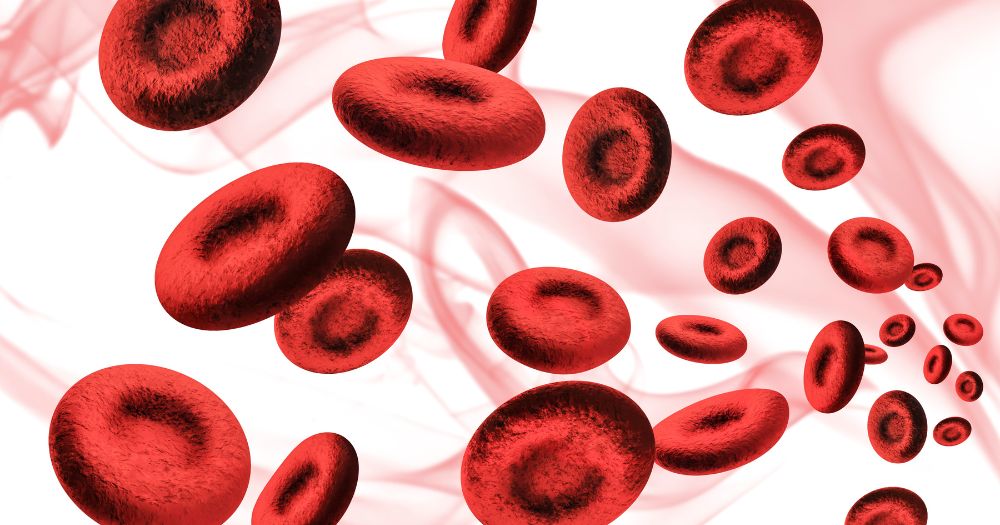As you age, heart health and circulation become increasing concerns you must manage if you wish to mitigate the associated risks. A sound regimen of vitamins and supplements, combined with a healthy diet and frequent exercise, could robustly support your cardiovascular health and circulation.
Vitamins are an essential part of a healthy diet. They are necessary for many functions in the body such as the production of red blood cells and other metabolic processes. However, not all vitamins are created equal. There are some vitamins that should be taken more often than others to maintain a healthy heart and circulation.
There is a long list of vitamins that can be beneficial for your heart and circulation, but here are 12 that stand out as the best vitamins for heart health and circulation.
Why Should You Support Heart Health And Circulation With Supplements And Vitamins?
Did you know that somebody has a heart attack every 40 seconds and that 805,000 people have heart attacks in the US yearly?
As heart health is critical to longevity and overall quality of life, it makes sense for you to seek every possible advantage and approach to improve it.
When it comes to heart health, there are some vitamins that can have a positive effect on your cardiovascular system. They include Vitamin D, Vitamin B12, and Vitamin B6.
A deficiency in any of these vitamins can lead to a number of issues including high blood pressure, atherosclerosis, and even heart failure.
Thus, getting enough vitamins, minerals, and other essential nutrients should be a top priority for those at risk of heart attacks. It should also be a vital preventative measure for those who don’t want to be at risk of heart attacks (or related diseases).
12 Tips On Finding The Best Supplements And Vitamins For Your Heart And Circulation

Disclaimer: Before taking any supplements discussed below, speak with your doctor or Registered Dietician about dosages. Also, you’ll need to combine supplementation with healthy eating habits and exercise to reap the most possible benefits (or any at all).
1. Fish Oil Products with Omega-3 Fatty Acids Are Some Of The Best Heart-Healthy Supplements

As a type of polyunsaturated fat, omega-3 fatty acids maintain and improve your heart health even if you already have heart disease.
The Mayo Clinic explains that, unlike other nutrients, the body can’t naturally produce omega 3, which needs to be ingested via food or supplement.
If you don’t eat enough fatty fish (e.g., salmon, trout, mackerel), taking a fish oil supplement could help ensure your body gets enough eicosapentaenoic acid (EPA) and docosahexaenoic acid (DHA).
Pros
- Supplements rich in omega-3 fatty acids are high in “good” cholesterol levels, which can help reduce high blood pressure and improve heart health
- These supplements also help improve blood circulation
Cons
- Fish-based supplements don’t interact well with blood-thinning medication
- These supplements can potentially cause adverse gastrointestinal symptoms
The Bottom Line On Fish Oil Supplements: Receiving enough omega-3 fatty acids through fish oil supplementation may be vital to your heart health if there isn’t much fish in your diet.
2. Introduce A Soluble Fiber Supplement To Help Your Heart
Multiple studies have discovered that high fiber intake–including from a fiber supplement–helps lower the risk of heart disease, says WebMD. The soluble fiber appears to reduce cholesterol levels by binding with it in the intestines and stopping absorption.
Additionally, fiber benefits circulatory health by stabilizing blood sugars and limiting fat absorption.
Pros
- Soluble fiber decreases cholesterol
- It also stabilizes blood sugars
Cons
- Many soluble fiber supplements aren’t third-party tested
The Bottom Line On Soluble Fiber Supplementation: A quality soluble fiber supplement could benefit your cardiovascular system and circulation. However, issues exist with a lack of third-party testing.
3. A Vitamin D Supplement Can Combat High Blood Pressure
Healthline cites research examining high blood pressure's association with deficient vitamin D levels.
The same report explores separate studies showing that increased vitamin D in the blood directly combats high blood pressure. More to the point, the study found a 30% reduced risk of high blood pressure in subjects with the most vitamin D (out of a 300,000-person sample size).
Pros
- Reducing high blood pressure with vitamin D means you’re improving blood flow to the heart
- Vitamin D helps prevent congestive heart failure
- Receiving enough vitamin D might also reduce cancer risks
Cons
- Taking too much vitamin D (10,000 IU or more) might generate too much calcium in your blood and urine, possibly leading to kidney stones and blood vessel calcification
The Bottom Line On Supplementing Vitamin D: If your blood pressure is too high, supplementing vitamin D might help with regulation and maintenance.
4. Folic Acid Can Help Maintain Healthy Blood Pressure
Folic acid is a b vitamin (specifically, vitamin B9) that might reduce blood pressure in heart-disease patients.
Additionally, increasing folate (used interchangeably with folic acid) during young adulthood could limit the risk of heart disease as you grow older.
Pros
- Folic acid promotes red blood cell formation, fostering healthy cell growth
- It also limits heart disease risk factors
Cons
The Bottom Line On Folic Acid Supplements: Folic acid can help reduce the risk of heart disease in young people and reduce blood pressure in heart disease patients. Consider adding these supplements to your regimen if you aren’t getting enough in your diet.
5. Vitamin E Can Help Optimize Blood Circulation... But Beware Of Heightened Risks
Healthline speaks to a study from 2019 that saw vitamin E supplements reduce blood pressure. Other studies cited in the same report found that vitamin E could reduce “bad” LDL cholesterol in people with metabolic syndrome combined with omega 3.

On the other hand, overly high levels of vitamin E can cause cardiovascular complications, so those with heart issues might be at risk when taking these supplements.
Pros
- Supplements are readily available
- Vitamin E might bolster your blood, brain, and skin health, and it has antioxidative properties
Cons
- These supplements can cause bleeding, headache, nausea, and fatigue in too high of doses–it’s potentially dangerous in 1,000 mg doses
- Such supplements could be dangerous for people with heart disease
The Bottom Line On Vitamin E Supplements: Vitamin E supplements can help with blood circulation, heart health, vision, skin, and reproduction. But it might be hazardous to the health of people with heart disease.
6. Introduce Iron Supplements To Aid Blood Flow

Iron helps your body produce myoglobin and hemoglobin. Hemoglobin–a red blood cell protein–helps your blood carry oxygen to your body's organs and tissues from your lungs.
Doctors might suggest supplementing iron and eating leafy greens instead of receiving it through red meat because of the associated heart disease risk factors related to processed beef.
Pros
- Iron supplements help reverse low iron levels and treat anemia (when the body doesn’t have enough red blood cells)
Cons
- Iron supplements can cause gastrointestinal issues like nausea, cramps, and diarrhea
The Bottom Line On Iron Supplements: Iron supplements are ideal if you suffer from anemia or you’re not getting enough iron in your diet and don’t want to up your red meat intake.
7. Enhance Circulation With L-Arginine Supplements
According to Medical News Today, studies indicate that those following a regimen involving the intake of multiple supplements, including one with L-arginine, experienced the following benefits:
- Compared to a placebo group, the group with supplementation experienced enhanced blood vessel health
- There was also a reduction in blood pressure
L-arginine is also present in some nuts and meats and is classified as a semi-essential amino acid.
Pros
- L-arginine is safe to take
- It might improve blood pressure and reduce angina symptoms
Cons:
- Side effects include nausea, worsened asthma symptoms, and allergic reactions
The Bottom Line On L-Arginine: Much is still to be learned about L-arginine and its impact on heart health and circulation, but current results show promise.
8. Warning: Say No To Calcium Supplements

Whether benefits exist from taking a calcium supplement is up for debate. In fact, research indicates that calcium supplements might exacerbate heart disease risk factors. The demographic seemingly most vulnerable to those side effects are postmenopausal women of generally sound health.
Pros
- Saying no to a calcium supplement could potentially save you from doing harm to your heart
Cons
- Conflicting studies exist citing the potential benefits of calcium supplements
The Bottom Line On Calcium Supplements: While research remains limited on this topic, we suggest avoiding calcium supplements until more benefits are proven and risks are disproven.
9. L-Carnitine: An Amino Acid That Protects Against Congestive Heart Failure
L-carnitine amino acid helps fat transform into energy in the mitochondria, thus, supporting healthy heart function.
It’s believed that L-carnitine supplements may reduce the damage to your cardiovascular health after congestive heart failure or a heart attack.
Pros
- L-carnitine supplements are often used as a weight-loss tool
- Such supplements may also help improve exercise performance
Cons
- L-carnitine can cause seizures, heartburn, upset stomach, and diarrhea
- It might also cause your sweat, urine, and breath to have a fishy odor
The Bottom Line On L-Carnitine: L-carnitine could help with weight loss, exercise, and heart health–especially if you already suffer from cardiovascular disease. Still, it’s not without its potential side effects.
10. Reduce Cardiovascular Risk Factors With Magnesium
Research indicates that having low magnesium levels are conducive to cardiovascular risk factors. Without enough magnesium, you could be more susceptible to cardiovascular disease, elevated blood pressure, plaque build-up in your arteries, increased LDL cholesterol, and hardened arteries.
Multiple types and mineral combinations of magnesium supplements exist, such as:
- Magnesium gluconate
- Magnesium hydroxide
- Magnesium citrate
- Magnesium sulfate (AKA Epsom salt used in baths to soak sore muscles)
Pros
- Magnesium reduces cardiovascular disease risk factors
- It also enhances cardiovascular health
Cons
- Magnesium supplements could be risky for patients with kidney disease
The Bottom Line On Magnesium Supplements: Magnesium can prevent many potential heart issues. Discuss taking these supplements with your doctor or Registered dietician.
11. Garlic Supplements Can Positively Impact Artery Health
Science suggests that garlic might do more than taste delicious.
To the above point, taking garlic as a supplement could help treat artery conditions, high blood pressure, and heart health.
Pros
- On top of all the potential circulation and heart-related benefits, garlic supplements may help your immune system
- Garlic might also prevent Alzheimer’s
Cons
- Garlic may increase bleeding risks because it can impact blood clotting
- Avoid garlic at least two weeks prior to undergoing any medical or dental procedure
The Bottom Line On Garlic Supplements: It likely wouldn’t hurt to experiment with garlic supplements and see if it spearheads the positive health outcomes you seek.
12. Beetroot Powder Can Reduce Blood Vessel Inflammation
The body converts nitrates into nitric oxide, which relaxes blood vessels and increases how much blood they can transport.
Nitrous oxide is present in red beetroot powder. Research indicates that nitrate-infused beetroot juice might reduce inflammation in the blood vessels and decrease blood pressure in 3 hours.
Pros
- Beetroot powder might regulate blood pressure and blood sugar
- It also may improve athletic performance
Cons
- Excessive consumption of beetroot could cause kidney stones
The Bottom Line On Beetroot Powder: Beetroot powder could work wonders for blood flow and your heart–discuss it with your healthcare provider if you want to learn more.
How Can Top Nutrition Coaching Help?

Misinformation about vitamins and supplements to improve heart health and circulation runs rampant on the internet.
When it comes to your heart, you can’t mess around. Instead of relying on blogs or YouTube videos, you’re better off receiving guidance from a specialized nutrition expert familiar with your health history.
Top Nutrition Coaching brings you a high level of expert guidance and education to optimize your cardiovascular system. Our team of Registered Dieticians specializing in heart health will help you find the vitamins and supplements that best suit your heart-related and circulatory needs.
When you choose Top Nutrition Coaching to help you with your heart health (and overall health), we come to you—you don’t even need to leave your living room. All that’s required is filling out our quiz, and we’ll match you with your ideal Registered Dietitian based on your answers.
Frequently Asked Questions
What is the best vitamin for the heart?
Omega 3, magnesium, folic acid (or folate), and vitamin D are all excellent vitamins for heart health.
How else can you improve circulation and heart health?
Performing exercises such as running, cycling, swimming, brisk walking, jumping rope, and playing tennis can all help heart health, as does well-rounded nutrition.
Is there a way to dissolve artery plaque?
There’s no magic bullet to immediately get rid of artery plaque. You need to make healthy lifestyle changes, and your condition may improve over time.













